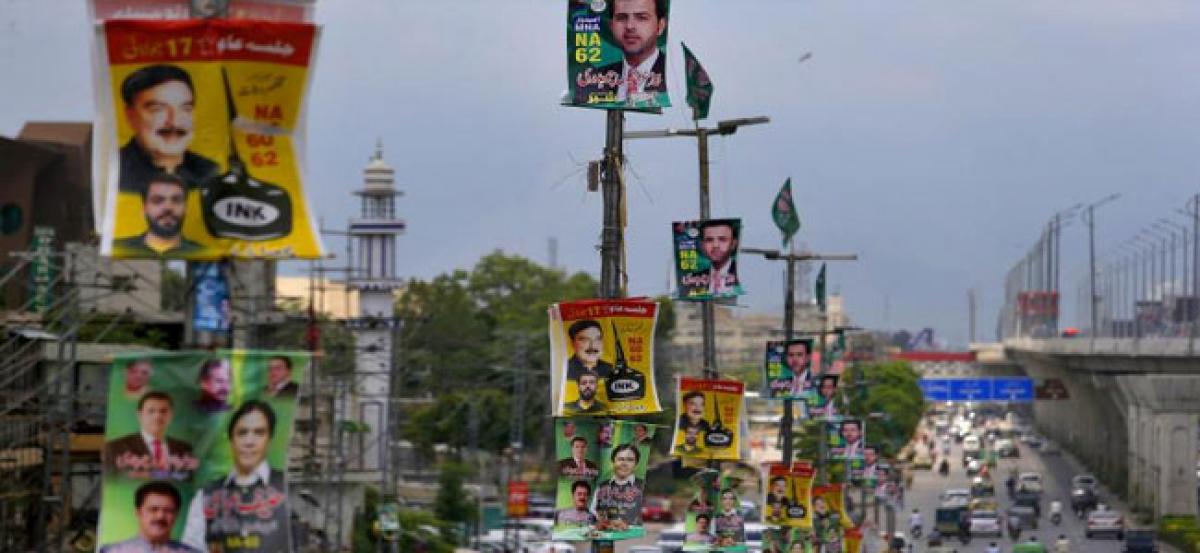Pakistan goes to polls amid Army interference, security threat

Voting opened today in Pakistans general elections to choose a new prime minister in the second democratic transition of power in the nations 70year chequered history The elections have been marred by allegations of military interference and a series of deadly attacks
Islamabad: Voting opened today in Pakistan's general elections to choose a new prime minister in the second democratic transition of power in the nation's 70-year chequered history. The elections have been marred by allegations of military interference and a series of deadly attacks.
According to the Election Commission of Pakistan (ECP), 3,459 candidates are contesting for 272 general seats of the National Assembly, while 8,396 candidates are running for 577 general seats of the four provincial assemblies - Punjab, Sindh, Balochistan and Khyber-Pakhtunkhwa.
There are 105.96 million registered voters in the country.
The voting started at 8 am local time on more than 85,000 polling stations.
The counting of votes will be done on the spot soon after polling is concluded and results will be announced within 24 hours.
For a smooth polling process, As many as 800,000 law enforcement and army personnel have been deployed across the length and breadth of the nation.
In a special message on Monday, Chief Election Commissioner Justice (retd) Sardar Raza Khan urged voters to fulfil their national duty of casting the ballot.
Around 220 million ballot papers have been printed for the election. The colour of ballot paper for the National Assembly is green, whereas white coloured paper shall be used for the Provincial Assembly.
Taking into account the wave of violence and terrorist attacks witnessed in the run-up to the elections, Peshawar's deputy commissioner has arranged 1,000 kafans (burial shroud) as a pre-emptive measure.
The troops have been deployed to provide mandated assistance to the Election Commission of Pakistan (ECP) to conduct polls, according to a statement by the Inter-Services Public Relations (ISPR).
More than 17,000 polling stations have been declared sensitive across the country, while CCTV cameras have also been installed at the polling stations, reported Geo TV.
A public holiday has been declared across the country on Wednesday in order to facilitate the voting process.
Pakistan's National Assembly comprises a total of 342 members, of which 272 will be directly elected today whereas the rest — 60 seats reserved for women and 10 for religious minorities — are selected later through proportional representation among parties with more than five per cent of the vote.
A party can only form the government if it manages to clinch 172 seats in total.
Pakistan saw intense campaigning ahead of the 11th general election by candidates from key parties, namely Pakistan Muslim League (Nawaz) (PML-N), Pakistan Tehreek-e-Insaf (PTI) and Pakistan's Peoples Party (PPP).
In the previous elections, PML-N, led by former Pakistan prime minister Nawaz Sharif, emerged as the largest party with 166 seats out of a total of 342 in the National Assembly.
Although the seats were short of a majority, Sharif was able to form a government after several independents joined his party.
However, Sharif was disqualified as the prime minister and as a Member of the National Assembly in July last year after the Panama Papers case decision.
After Sharif's disqualification, Shahid Khaqan Abbasi was elected as 18th Prime Minister of Pakistan by the National Assembly in August 2017.
While the country is going to polls, Sharif and his daughter, Maryam, are currently lodged in Rawalpindi's Adiala jail, after being convicted in the Avenfield reference case.
















